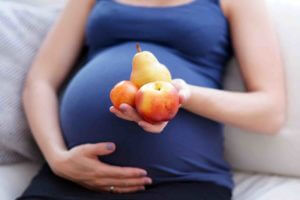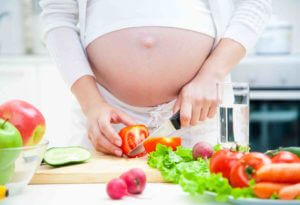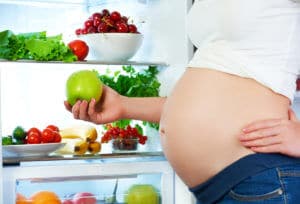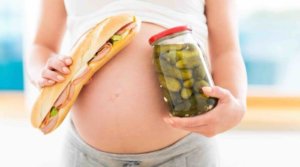Tuna in pregnancy is always a risk. You cannot know how contaminated the fish is. Whether canned or raw, you should generally limit the consumption of tuna during this time.
But how much is allowed – and what are tasty alternatives?
Table of contents
Tuna During Pregnancy: Always Think Of Your Child
Whether canned tuna or fresh fish: we Germans love tuna! In 2017 alone, we consumed a total of 151222 tons of it! The trend is increasing, because this fish not only tastes good, it is also low in calories and therefore extra healthy.
Currently, each German consumes an average of about three kilos a year. Canned tuna is way out in front, with about 97 percent.
But the wonderfully juicy fish can contain a lot of mercury. It goes without saying that this is not good for the unborn. Mercury affects the human brain.
What already causes problems for adults can become really dangerous for unborn babies and infants. It is true that no one will die if you eat tuna during pregnancy. But the healthy development of the child is at stake.
Expectant mothers should therefore refrain from eating it for a while – this applies to fresh fish, defrosted fish and canned tuna. Breastfeeding mothers should also refrain from eating tuna after giving birth.
There are corresponding warnings from federal authorities, such as the Federal Institute for Risk Assessment (BfR) and also from the Federal Environment Ministry. They all consider the risk from tuna during pregnancy and breastfeeding to be high. This is because the expectant mother always also feeds her child and thus influences its development.
This Is Why Tuna Is So Dangerous During Pregnancy
Unborn babies and infants are particularly sensitive. Although their bodies are developing rapidly, they need special protection because they still have a few peculiarities. For example, nutrients reach their brains more quickly.
But this also makes them more susceptible to many harmful substances. Mercury is one of the substances that damage unborn babies. So it can negatively affect your child’s brain if you eat tuna during pregnancy – the more, the greater the danger.
There are studies on the amount of mercury that accumulates in the human body. For example, it was found that people who live along the Mediterranean Sea have a higher percentage of mercury in them.
It is reasonable to assume that there is a connection with the fish consumed; after all, a lot of fish is traditionally eaten here. But canned tuna is therefore no less dangerous, as we show below.
Pregnancy And Breastfeeding: Your Child Eats With You
As early as around the turn of the millennium, the contamination of tuna with mercury became known. Since then, consumer protection agencies and federal authorities have regularly warned against eating tuna during pregnancy.
This is because the expectant mother is always feeding her child as well. In the process, the composition of the food changes with what the mother herself eats.
Mercury therefore not only damages the mother’s brain, but also that of the unborn child. It passes effortlessly through the placenta into the unborn child, and optionally through the mother’s milk during breastfeeding. The damage done is irreparable.
Tuna In Pregnancy And The Possible Consequences For Your Child
- Damage to the brain.
- Nerve damage.
- Kidney damage.
- Mercury may also affect the heart and immune system.
Tuna And Pregnancy: How Does The Mercury Get Into The Fish?
Fish need to eat, just like any other living creature. They do not eat pure mercury, of course. Rather, this accumulates in lower levels of the food chain, such as in plankton or other small fish.
All these plant and animal bodies accumulate more and more of it the higher they are in the food chain. This is why tuna in pregnancy is so dangerous: as a predatory fish, it is at the top of the food chain and therefore accumulates particularly high levels of mercury.
The inorganic mercury is converted into organic mercury in the body during this time. But mercury remains mercury and as such is toxic for you and your unborn child.
For those who want to know more, here is a little chemistry.
Mercury is actually inorganic. But with the help of bacteria, methylmercury (MeHg+) is formed, which is organic mercury. Only this organic mercury enters the food chain and accumulates there.
It accumulates in protein and internal organs, while other lipophilic substances (which are fat-soluble substances) tend to accumulate in fatty tissue. Tuna during pregnancy is therefore particularly treacherous, because tuna is actually particularly healthy!
Tuna During Pregnancy: From Pleasure To Danger
Here lies one of the problems: Tuna is so healthy because it is a low-fat, high-protein fish. But with contaminated fish, eating it becomes a danger, because you take in a lot of mercury when you eat it.
In addition, tuna can become very old: up to fifteen years. This gives it a lot of time to absorb food. The more it eats, the more mercury it can contain. Other fish don’t even get old enough to collect relevant amounts.
The EU also takes this into account: It has set upper limits that determine the maximum mercury content. Depending on the type of fish, there is sometimes more and sometimes less.
EU Upper Limits For Mercury In Fish
Fish that grow to very old age, such as tuna, may contain a maximum of one milligram of mercury – per kilo of fish. For fish that do not grow so old, it is less: Here, the maximum content of 0.5 milligrams per kilo of fish applies, i.e. half. If these upper limits are adhered to, the EU explains, there would be no danger to the general public.
Nevertheless, German authorities such as the BfR warn that pregnant women and nursing mothers are particularly at risk in terms of nutrition and behavior. Therefore, different rules apply to them. They should generally avoid tuna during pregnancy and while breastfeeding.
This even applies to other fish: not only tuna accumulates a lot of mercury in the course of its life.
What Other Types Of Fish Does This Apply To?
There are even more fish that, like tuna, can cause harm during pregnancy. These are mainly predatory fish, for which the same applies as for tuna. Unfortunately, you can’t tell from the processed fish what it was when it was alive, and not every buyer knows fish well.
Here is a list of fish that you should not eat too often:
- Shark.
- Eel.
- Mackerel.
- Halibut.
- Redfish.
- Halibut.
- Monkfish.
- Pike.
- Stonecutter.
- Lobster.
Does The Recommendation Also Apply To Canned Tuna?
Yes. Canned tuna is cooked through, which reduces the risk of parasites. But mercury is not destroyed when it is heated. Therefore, it is best to avoid tuna in any form during pregnancy and breastfeeding.
Heated tuna and pregnancy are therefore mutually exclusive, as are raw fish and pregnancy.
What Quantities Of Tuna Are Safe During Pregnancy?
According to studies, even small amounts can have a negative effect on brain development. While this does not necessarily have to happen, you are taking a risk with any consumption of tuna during pregnancy.
Analyses Of Tuna During Pregnancy
According to an analysis by the German Federal Institute for Risk Assessment (BfR), individual samples of tuna still exceeded EU maximum levels in 2008. This refers both to fresh fish, such as tuna steak.
But it also concerned canned tuna, which came close to the maximum values. It is obvious that this is not good for you or your child!
Where tuna can become a problem:
- Tinned tuna.
- Tuna on pizza.
- Tuna in salad.
- Tuna in pasta sauces.
- Tuna on the baguette.
Now you do not have to do without these things in general. You should only choose a different fish if you want to eat a pizza. And you should pay attention to the quantity because a lot depends on it.
Tuna On Pizza And Co. During Pregnancy: So Much Is Harmless
There are no objections to infrequent consumption. According to the recommendations of some experts, you can even eat a little of such problematic fish once a month. Of course, it is safer to limit the consumption even more.
It is only a few months and you protect your child. The BfR even recommends not eating tuna during pregnancy.
If you still want to become pregnant, you should also consider this! Here is a recommendation from the EU Food Safety Authority. Do not eat more than 100 g of predatory fish per week. In addition, refrain from eating other fish and eat tuna, in particular, no more than twice a week.
Accidentally Eaten Tuna During Pregnancy – What To Do?
Whether tuna baguette and pregnancy is really such a problem, many expectant mothers wonder. Sometimes you just do not think about all the advice and rules of conduct.
Then it’s just the huge appetite that wants to be satisfied. After all, pregnant women eat for two during this time! So it can happen that you only remember afterward: “Tuna and pregnancy, I’d better not do that.
To reassure you: If you have only eaten tuna once or twice by mistake during pregnancy, then it is not so bad. It can’t be undone now anyway. Just make sure it doesn’t happen again in the future.
Delicious Alternatives To Tuna During Pregnancy
But let’s not forget: fish, like other fish, provides important nutrients. Your baby needs these too for healthy development! The old recommendation to eat fish twice a week therefore also applies during pregnancy. But it should be fish other than tuna.
The reason for these recommendations is surely known to you: Fish contains many essential omega-3 fatty acids, selenium and iodine. Therefore, don’t make the mistake of foregoing all of this out of fear for your child.
On the contrary, your child will benefit from the valuable nutrients in fish: minerals and easily digestible proteins are vital! And the omega-3 fatty acids have been shown to improve fine motor skills, speech, and social behavior in children later in life. Fortunately, there is many fish that are safe for you and your unborn child.
You Can Eat This Fish During Pregnancy
- Herring.
- Trout.
- Carp.
- Pollock.
- Plaice.
- Haddock.
- Cod.
However, be careful not to eat these fish raw. Raw fish is not only sushi, but also smoked salmon, trout fillets or pickled herring, such as matjes. These varieties may contain parasites! The risk of foodborne infection, such as toxoplasmosis, is simply too high.
In addition to the nutrients mentioned above, an unborn baby also needs many vitamins. Read more here about how to provide yourself and your child with the best possible supply.
Tuna In Pregnancy: A Conclusion
You can’t be too careful: Less tuna during pregnancy is the rule of thumb! Because tuna has been proven to contain a lot of mercury, which can harm you and your unborn child.
Tuna grows very old and is high up in the food chain. That is why so much of it accumulates especially in this fish. Whether it is canned tuna or raw fish, as in sushi, is relatively unimportant.
But you don’t have to give up fish completely during pregnancy. Therefore, stick to the alternatives, such as trout. This way you are on the safe side because the pollutant load is not as high.
The EU has set maximum mercury levels for fish. Nevertheless, it is better to be careful with tuna during pregnancy and protect your child from irreparable damage.












